Connect
EMPOWERED WOMEN WE LOVE: MALIA BARNES
At barre3, we’re on a mission to help people feel empowered from within—but what does this mean, and how do you get there? Just like our class, there’s not a one-size-fits-all answer. Discovering your inherent strength can happen in a million different ways, but no matter how you get there, the end result is the same: When you’re empowered from within, you look inside yourself for answers and trust that you are your own best teacher.
In our Empowered Women We Love series, we talk to inspiring women from our diverse community who have tapped into their inherent strength to lead a life that’s empowered from within.
When Malia Barnes joined the Home Office team at barre3, we could see that she was a superstar. Kind, bright, and endlessly curious, she was clearly the kind of person who could do anything she put her mind to. What we couldn’t see was that she was suffering from an eating disorder.
Last spring, Malia checked herself into a treatment center, where she did the incredibly brave and difficult work of addressing not just her eating disorder, but also the psychological root of it. After three vulnerable, soul-searching months, she emerged stronger, more authentic, and more at peace with herself than ever before. The superstar we saw from the beginning is still there, but now she’s empowered from within—and that’s the most important superstar trait of all.
We sat down with Malia to talk about her journey. Read on to learn why eating disorders aren’t just about the food, why she takes issue with the body-positivity movement, and what she carries with her to remind her that she holds the key to her happiness. And don’t forget to join the empowerment conversation by posting on Instagram with the caption: “I feel empowered from within when _________.” (Be sure to use the hashtags #barre3 and #bempowered to enter to win our weekly giveaways!)
Barre3: What do you think society defines as the ideal woman?
Malia: I think this varies by culture, race, socioeconomic status, etc. Each group has its own standards by which it measures success. But the main point and problem is that, no matter what the culture, there’s a set definition—one ideal that every woman in that group is expected to live up to.
And it’s not even just aesthetic. Society’s influence infiltrates our ambitions, our relationships, our careers—everything. For example, our culture tells us to be “boss ladies,” and to play a strong independent role in our relationships. This emphasis on power and independence totally fails to acknowledge that we need to lean on partners and our community to thrive, that we need to fail sometimes, and that maybe we don’t want to achieve “perfection” or “greatness,” but just live a content life.
Barre3: What pressures have you experienced as a woman?
Malia: For a long time, the dominant pressures were to look a certain way, be a certain size, achieve a certain body shape—that kind of thing. Right now there’s a swell of “body positivity” in branding, which is fantastic in that it’s more inclusive, but I feel like it’s still a form of pressure—and it’s narrow-minded in some important ways. The current message is that body positivity is about loving your body, or at least aspects of your body, even if they don’t fit an ideal. But to me, a healthier approach is “I see you, stomach. I see you, disproportionate breasts. I see you and I have no reaction.” That’s different from feeling pressure to love something—or everything—about your body. I don’t feel like I have to be in love with my body. I do have reverence for it. It’s the thing that gets me around in the world, it’s healthy, it’s what will carry and bear my children—and for that I’m so grateful. But I don’t want young girls (or anyone) to think they have to obsess over their bodies, even if it’s a “positive” obsession. I’m more interested in what people dream about doing in life and how they’re making it happen.
Do I need to be in love with my physical body all the time? Or even be thinking about it? No.
As nice as the body-positivity movement sounds, let’s not overlook the fact that it still keeps us hyper-focused on bodies. I want to focus on developing passions, relationships, a sense of identity and purpose. I want that for every woman—every person, really.
Barre3: How have you been affected by the pressures you’ve experienced?
Malia: I lived with an eating disorder for 11 years. I can almost pinpoint exactly when it started. When I was 14 years old, I was being bullied badly in school. My home life wasn’t stable, so I didn’t feel like I had a safe place anywhere in my life. Then I won a competition to be in Teen Vogue. Suddenly the bullying stopped, and I got the message that looking a certain way and fitting an ideal was my path to success—to happiness, really. I realized that modeling could be an escape from my current life, and I started to obsess over it. I remember browsing modeling websites, looking up weights and measurements for models, and weighing myself constantly. I remember the high of getting on the scale and seeing that the number had dropped. I was fixated on changing my body to be someone else.
This was probably the closest I’ve ever been to looking like what our society deems as the “ideal” body type, but I was miserable. I constantly felt like I’d be happier, more confident, better, when I weighed just a little less, and yet when I reached whatever number that was, I still didn’t feel fulfilled. I suffered from terrible body dysmorphia, where you truly can’t see your body for what it is.
At the same time, I developed horrible social anxiety. I’d ditch class when I was supposed to give a presentation. It got to the point where I couldn’t even go to the grocery store alone. When I tried to express my truth to people close to me, I was shut down. And yet this whole time my life looked great from the outside. When what people see and think about you is different from how you feel, it’s a form of hell. You don’t feel seen. It’s as if you don’t exist.
Barre3: Was there a point at which you made a conscious decision to reject external pressures to be the “ideal” woman? How did you reach that point?
Malia: I finally admitted to myself that I had an eating disorder, and I went through some outpatient treatment. At the time I felt better, but I realize now that I barely scratched the surface. My “solution” was to take all the energy I was devoting to my eating disorder and instead devote it to being the perfect “wellness woman.” I was eating excessive greens with my meals, hydrating like a fish, exercising religiously four times a week. On paper that might look healthy, but when something as small as missing a workout causes you to judge yourself or think you have to compensate by working out double the amount the next day, it’s not healthy—it’s obsessive. I now know that I simply traded one disorder for another—orthorexia, which is a fixation on healthy eating and adhering to a strict exercise regime.
When my original eating disorder surfaced again a few years later, I knew I needed treatment. But this time I committed to treating not just the surface-level manifestation of the problem, but also the psychological elements that were at the root of it. There’s a saying in the treatment community: Eating disorders are about the food but they’re also not about the food. The root of these disorders is shame, and the disorder emerges as a way to escape the shame. In order to truly recover, I needed to address not just my relationship with food, but also my mental health.
With the help of my therapist, I found and checked myself into a treatment center. This was the most life-changing thing I have ever done, and it was beyond a doubt my turning point. I understand so much more now, not just about my eating disorder, but also about what was at the root of it. For the first time in my life, I learned body trust. I now know how to ask my body what it wants and actually listen to the answer. When I work out, it’s not because I “should,” but because my body is craving movement. When I choose what to eat, I decide based on what I truly want, not what I think is “good” or “healthy” or “clean” food. I pay no attention to the so-called “wellness community” because I’ve learned that it’s based on so many misconceptions about what’s actually good for us. I can truly say I feel like a different person, but at the same time I’ve also never felt so much like myself as I do now.
Barre3: What does it feel like to live your truth?
Malia: Freeing. Electric. Tiring.
Barre3: When do you feel like your most authentic self?
Malia: Just after I’ve journaled, when my brain is quiet for a few moments.
Barre3: What’s a time in your life when you felt the proudest of your body?
Malia: When I was 3, I had a severe allergic reaction. There were six doctors in the hospital room and they all lost hope. A priest said the last rites and everything. Then by some miracle, another doctor came in and suggested a last-ditch effort treatment. It worked. I obviously only know about this through pictures and stories from my parents. But I thank my tiny self sometimes for hanging in there.
Barre3: When do you feel most proud of yourself?
Malia: When I do the right thing when no one’s watching.
Barre3: How would you fill in the blank: “I feel empowered from within when _______________________.”
Malia: I feel empowered from within when I live in accordance with my values. Hope, kindness, community, humor, health—I won’t bore you with them all, but there are 11 I try to focus on. Sometimes I forget about them. But I have them on display in my apartment to jog my memory and remind myself why I’m here. Even if I just glance at them and I’m reminded to call a friend, book a therapy appointment, or watch a funny Mr. Bean clip for a laugh, that’s a win.
Barre3: What if success in fitness weren’t defined by how you look?
Malia: The fitness industry was created on the back of body-shaming. We know that movement feels good to our bodies, but we’ve become obsessed with the idea that movement only serves us if it is to “improve” our bodies. A world without body-shaming would be a world of more fulfilled people. Swapping hours of over-exercising and critiquing ourselves for time spent developing relationships with others and ourselves = contentment.
Barre3: What would life as a woman feel like if the world didn’t judge you by external measures?
Malia: A better question is “what would life be like if you didn’t judge yourself?” I don’t think women, or men, will be judged wholly by internal measures in our lifetime.
But other people’s judgements don’t mean a thing if you ignore them. There’s a scrap in my wallet I cut out of Meditations, by Marcus Aurelias, that says “It’s silly to try to escape other people’s faults. They are inescapable. Just try to escape your own.”
It reminds me that I hold the key to my happiness.
Thank you, Malia, for sharing your story! To join the empowerment conversation, post a photo on Instagram with the caption: “I feel empowered from within when _________.” #barre3 #bempowered
And don’t forget to join us for our revolutionary January Challenge, designed to help you feel balanced in body and empowered from within. Get all the details and sign up here.
At barre3, we’re on a mission to help people feel empowered from within—but what does this mean, and how do you get there? Just like our class, there’s not a one-size-fits-all answer. Discovering your inherent strength can happen in a million different ways, but no matter how you get there, the end result is the same: When you’re empowered from within, you look inside yourself for answers and trust that you are your own best teacher.
In our Empowered Women We Love series, we talk to inspiring women from our diverse community who have tapped into their inherent strength to lead a life that’s empowered from within.
When Malia Barnes joined the Home Office team at barre3, we could see that she was a superstar. Kind, bright, and endlessly curious, she was clearly the kind of person who could do anything she put her mind to. What we couldn’t see was that she was suffering from an eating disorder.
Last spring, Malia checked herself into a treatment center, where she did the incredibly brave and difficult work of addressing not just her eating disorder, but also the psychological root of it. After three vulnerable, soul-searching months, she emerged stronger, more authentic, and more at peace with herself than ever before. The superstar we saw from the beginning is still there, but now she’s empowered from within—and that’s the most important superstar trait of all.
We sat down with Malia to talk about her journey. Read on to learn why eating disorders aren’t just about the food, why she takes issue with the body-positivity movement, and what she carries with her to remind her that she holds the key to her happiness. And don’t forget to join the empowerment conversation by posting on Instagram with the caption: “I feel empowered from within when _________.” (Be sure to use the hashtags #barre3 and #bempowered to enter to win our weekly giveaways!)
Barre3: What do you think society defines as the ideal woman?
Malia: I think this varies by culture, race, socioeconomic status, etc. Each group has its own standards by which it measures success. But the main point and problem is that, no matter what the culture, there’s a set definition—one ideal that every woman in that group is expected to live up to.
And it’s not even just aesthetic. Society’s influence infiltrates our ambitions, our relationships, our careers—everything. For example, our culture tells us to be “boss ladies,” and to play a strong independent role in our relationships. This emphasis on power and independence totally fails to acknowledge that we need to lean on partners and our community to thrive, that we need to fail sometimes, and that maybe we don’t want to achieve “perfection” or “greatness,” but just live a content life.
Barre3: What pressures have you experienced as a woman?
Malia: For a long time, the dominant pressures were to look a certain way, be a certain size, achieve a certain body shape—that kind of thing. Right now there’s a swell of “body positivity” in branding, which is fantastic in that it’s more inclusive, but I feel like it’s still a form of pressure—and it’s narrow-minded in some important ways. The current message is that body positivity is about loving your body, or at least aspects of your body, even if they don’t fit an ideal. But to me, a healthier approach is “I see you, stomach. I see you, disproportionate breasts. I see you and I have no reaction.” That’s different from feeling pressure to love something—or everything—about your body. I don’t feel like I have to be in love with my body. I do have reverence for it. It’s the thing that gets me around in the world, it’s healthy, it’s what will carry and bear my children—and for that I’m so grateful. But I don’t want young girls (or anyone) to think they have to obsess over their bodies, even if it’s a “positive” obsession. I’m more interested in what people dream about doing in life and how they’re making it happen.
Do I need to be in love with my physical body all the time? Or even be thinking about it? No.
As nice as the body-positivity movement sounds, let’s not overlook the fact that it still keeps us hyper-focused on bodies. I want to focus on developing passions, relationships, a sense of identity and purpose. I want that for every woman—every person, really.
Barre3: How have you been affected by the pressures you’ve experienced?
Malia: I lived with an eating disorder for 11 years. I can almost pinpoint exactly when it started. When I was 14 years old, I was being bullied badly in school. My home life wasn’t stable, so I didn’t feel like I had a safe place anywhere in my life. Then I won a competition to be in Teen Vogue. Suddenly the bullying stopped, and I got the message that looking a certain way and fitting an ideal was my path to success—to happiness, really. I realized that modeling could be an escape from my current life, and I started to obsess over it. I remember browsing modeling websites, looking up weights and measurements for models, and weighing myself constantly. I remember the high of getting on the scale and seeing that the number had dropped. I was fixated on changing my body to be someone else.
This was probably the closest I’ve ever been to looking like what our society deems as the “ideal” body type, but I was miserable. I constantly felt like I’d be happier, more confident, better, when I weighed just a little less, and yet when I reached whatever number that was, I still didn’t feel fulfilled. I suffered from terrible body dysmorphia, where you truly can’t see your body for what it is.
At the same time, I developed horrible social anxiety. I’d ditch class when I was supposed to give a presentation. It got to the point where I couldn’t even go to the grocery store alone. When I tried to express my truth to people close to me, I was shut down. And yet this whole time my life looked great from the outside. When what people see and think about you is different from how you feel, it’s a form of hell. You don’t feel seen. It’s as if you don’t exist.
Barre3: Was there a point at which you made a conscious decision to reject external pressures to be the “ideal” woman? How did you reach that point?
Malia: I finally admitted to myself that I had an eating disorder, and I went through some outpatient treatment. At the time I felt better, but I realize now that I barely scratched the surface. My “solution” was to take all the energy I was devoting to my eating disorder and instead devote it to being the perfect “wellness woman.” I was eating excessive greens with my meals, hydrating like a fish, exercising religiously four times a week. On paper that might look healthy, but when something as small as missing a workout causes you to judge yourself or think you have to compensate by working out double the amount the next day, it’s not healthy—it’s obsessive. I now know that I simply traded one disorder for another—orthorexia, which is a fixation on healthy eating and adhering to a strict exercise regime.
When my original eating disorder surfaced again a few years later, I knew I needed treatment. But this time I committed to treating not just the surface-level manifestation of the problem, but also the psychological elements that were at the root of it. There’s a saying in the treatment community: Eating disorders are about the food but they’re also not about the food. The root of these disorders is shame, and the disorder emerges as a way to escape the shame. In order to truly recover, I needed to address not just my relationship with food, but also my mental health.
With the help of my therapist, I found and checked myself into a treatment center. This was the most life-changing thing I have ever done, and it was beyond a doubt my turning point. I understand so much more now, not just about my eating disorder, but also about what was at the root of it. For the first time in my life, I learned body trust. I now know how to ask my body what it wants and actually listen to the answer. When I work out, it’s not because I “should,” but because my body is craving movement. When I choose what to eat, I decide based on what I truly want, not what I think is “good” or “healthy” or “clean” food. I pay no attention to the so-called “wellness community” because I’ve learned that it’s based on so many misconceptions about what’s actually good for us. I can truly say I feel like a different person, but at the same time I’ve also never felt so much like myself as I do now.
Barre3: What does it feel like to live your truth?
Malia: Freeing. Electric. Tiring.
Barre3: When do you feel like your most authentic self?
Malia: Just after I’ve journaled, when my brain is quiet for a few moments.
Barre3: What’s a time in your life when you felt the proudest of your body?
Malia: When I was 3, I had a severe allergic reaction. There were six doctors in the hospital room and they all lost hope. A priest said the last rites and everything. Then by some miracle, another doctor came in and suggested a last-ditch effort treatment. It worked. I obviously only know about this through pictures and stories from my parents. But I thank my tiny self sometimes for hanging in there.
Barre3: When do you feel most proud of yourself?
Malia: When I do the right thing when no one’s watching.
Barre3: How would you fill in the blank: “I feel empowered from within when _______________________.”
Malia: I feel empowered from within when I live in accordance with my values. Hope, kindness, community, humor, health—I won’t bore you with them all, but there are 11 I try to focus on. Sometimes I forget about them. But I have them on display in my apartment to jog my memory and remind myself why I’m here. Even if I just glance at them and I’m reminded to call a friend, book a therapy appointment, or watch a funny Mr. Bean clip for a laugh, that’s a win.
Barre3: What if success in fitness weren’t defined by how you look?
Malia: The fitness industry was created on the back of body-shaming. We know that movement feels good to our bodies, but we’ve become obsessed with the idea that movement only serves us if it is to “improve” our bodies. A world without body-shaming would be a world of more fulfilled people. Swapping hours of over-exercising and critiquing ourselves for time spent developing relationships with others and ourselves = contentment.
Barre3: What would life as a woman feel like if the world didn’t judge you by external measures?
Malia: A better question is “what would life be like if you didn’t judge yourself?” I don’t think women, or men, will be judged wholly by internal measures in our lifetime.
But other people’s judgements don’t mean a thing if you ignore them. There’s a scrap in my wallet I cut out of Meditations, by Marcus Aurelias, that says “It’s silly to try to escape other people’s faults. They are inescapable. Just try to escape your own.”
It reminds me that I hold the key to my happiness.
Thank you, Malia, for sharing your story! To join the empowerment conversation, post a photo on Instagram with the caption: “I feel empowered from within when _________.” #barre3 #bempowered
And don’t forget to join us for our revolutionary January Challenge, designed to help you feel balanced in body and empowered from within. Get all the details and sign up here.


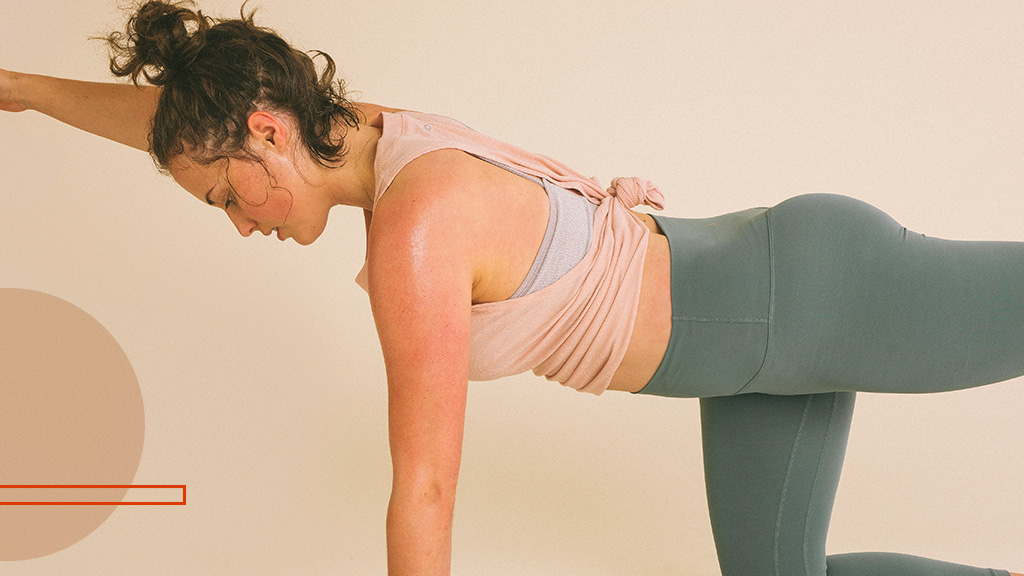
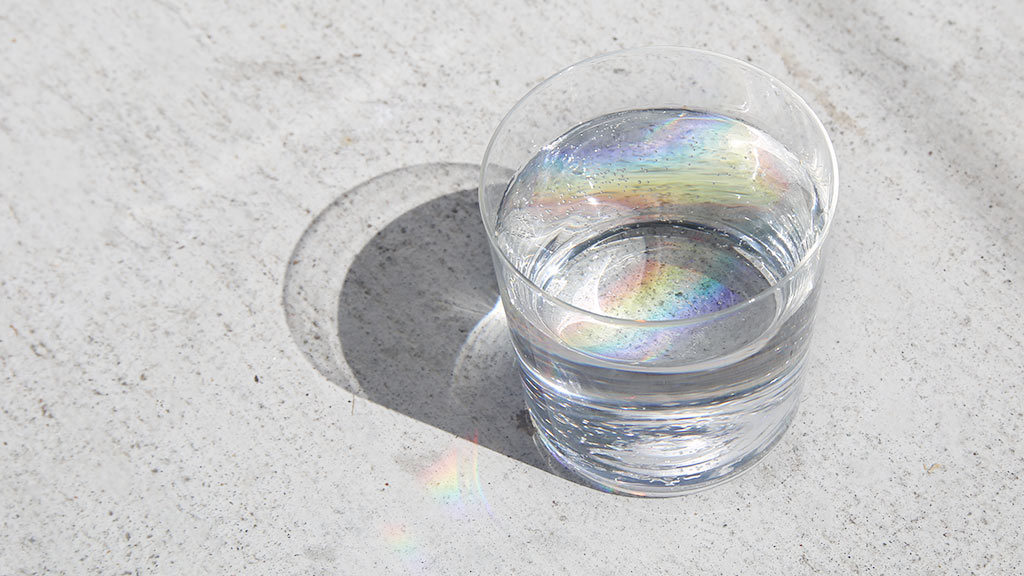
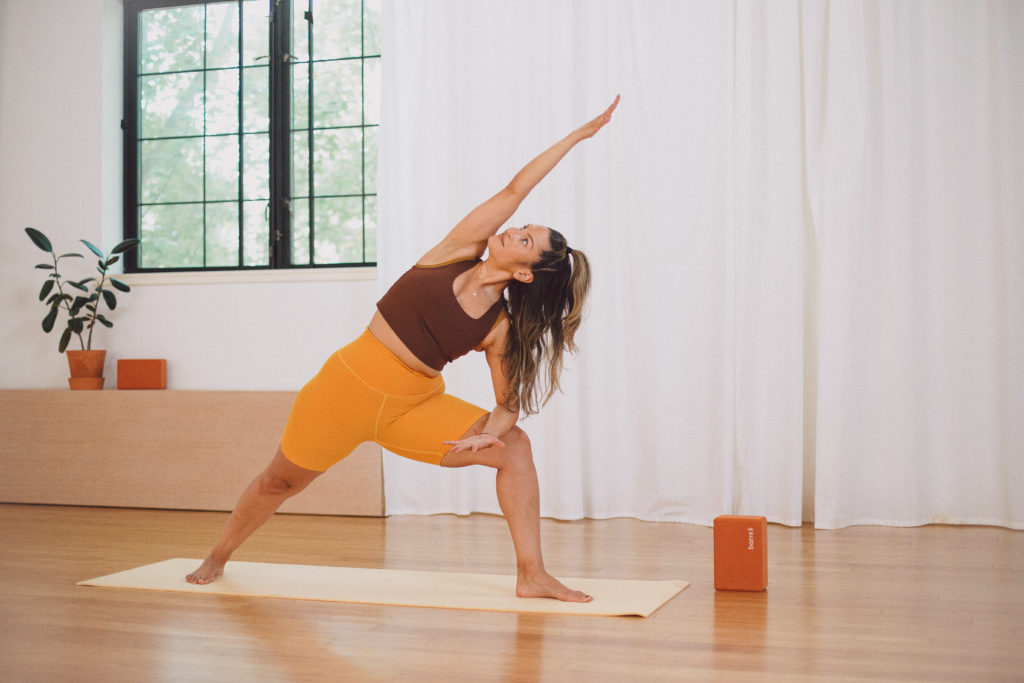
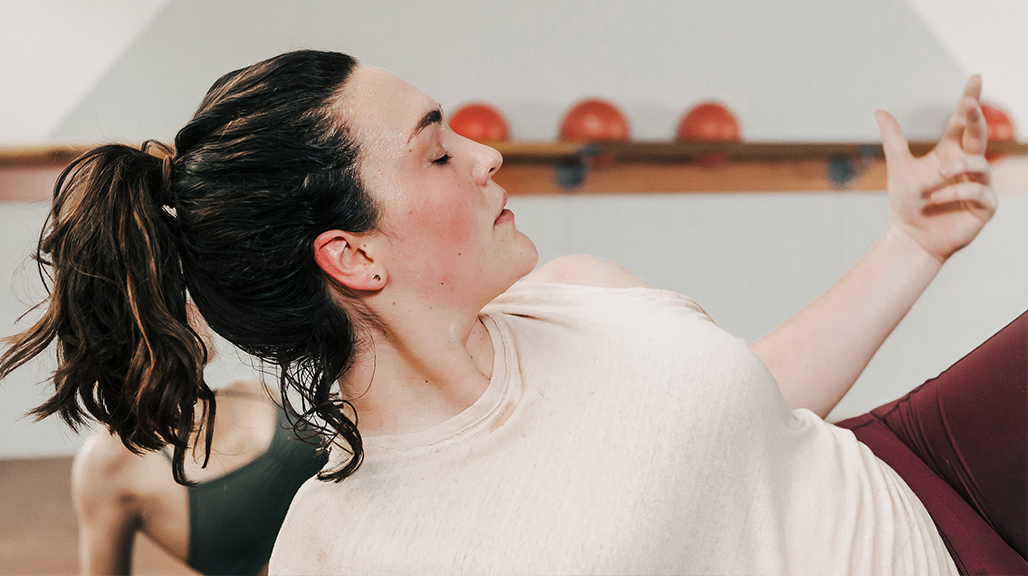
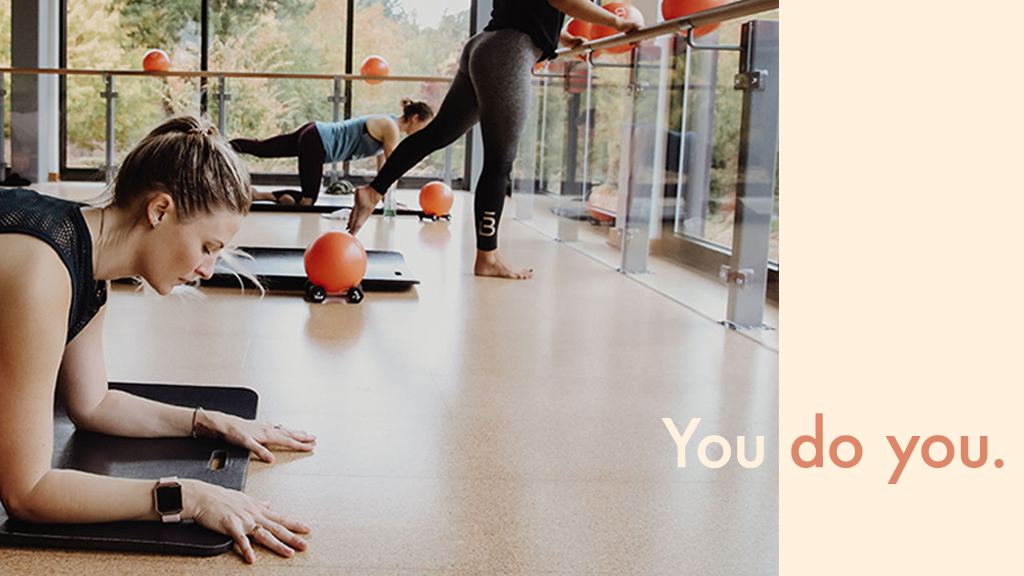



3 people have left a comment. Join the conversation!
View Comments